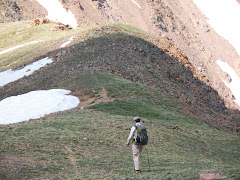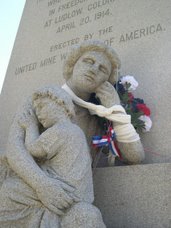
This is one of the items posted in a group I'm a member of with vets, families, survivors of children killed and Katrina survivors. PTSD is a frequent topic. I'm also going to post the comments of a mom who is a member of the group. She responds to this article and to my article titled "The Reality of PTSD on Communities".
Terry Leichner, RN
VVAW
woke up this morning and grabbed the morning paper, I was surprised
and very saddened to see this very awakening headline, "War shadows
soldier home- then it kills" now I am on a quest to speak with this
family! here is a link to my hometown newspaper
www.globegazette.com ....here is the article:
GRUNDY CENTER — He always intended to be a policeman. To get there —
with his parents' guidance —Josh Omvig became a soldier.
"He was a nice young man," Ellen says.
A mother's pained love.
"He was a pretty straight arrow," Randy says.
A father's wounded joy.
They knew Josh experienced combat in Iraq as an Army reservist. By
connecting the dots, they concluded their son probably participated
vigorously. Too late, they realized the person they got back from
the war on terrorism was not the young man they sent.
Sadly, they say, post-traumatic stress disorder was only a vague
concept until they saw Josh's world unravel.
"In retrospect, we probably should have pushed harder," Randy says.
His tone conveys little confidence the couple actually believe they
could have saved their boy. As they see it, odds weighed heavily
against their son.
"I keep thinking about it," Randy says. "But it was a no-win
situation for Josh."
The soldier told his mother once he died in Iraq. But he kept living
for another year.
Burning desire
Josh, a former Boy Scout with a newspaper route, wanted to join the
military early. His parents refused to sign paperwork required of a
17-year-old and made him wait.
"It is an adult decision. It is seven years of your life," Randy
remembers telling his son.
Later, the couple insisted their son investigate several branches of
the armed forces before making a commitment. And they helped.
"Josh was pretty focused," Randy says.
He enlisted in the 339th Military Police Co. based in Davenport.
"When he signed up, they hadn't been activated in more than 30
years," Randy says.
The choice was logical for an aspiring policeman or sheriff's deputy.
"He figured the best way to get some experience was to go into the
reserves," Randy says.
Josh graduated a semester early from Grundy Center High School.
Within two days he was training at Fort Leonard Wood in Missouri.
The company deployed to Guantanamo Bay, Cuba, guarding suspected
members of al Qaida. But Josh was not yet ready. Meanwhile, he
enrolled in law enforcement courses at Hawkeye Community College.
"But sitting in the classroom was kind of tough on him," Randy says.
Josh seemed to enjoy much more the ride-alongs he arranged with
sheriff's deputies in Tama, Grundy and Hardin counties.
He liked the action part of it," Randy says.
Josh started working for a security company in Des Moines and became
a supervisor. He moved to Altoona.
In 2003, the soldiers in the 339th — back from Cuba — and Josh and
his parents anticipated what lay ahead.
"They kept telling them all summer, `You're going to be activated
real soon,' " Ellen says. "That went on for months."
Josh got ready, had his teeth checked and deposited DNA samples with
the military. Officials activated the 339th once again in December
2003 and the company deployed to Iraq in February 2004.
The soldiers' mission included guarding people and enemy munitions.
At times, they protected convoys. Shifts were 15 hours. Their camp
at one point was mortared daily.
Temperatures inside tents exceeded 100 degrees at night, Josh said,
and soldiers resorted to flea collars on their beds and around
ankles to stop the pests. But that didn't work too well, Ellen says,
because the toxic chemicals irritated the soldiers' skin.
"It was pretty rough conditions for them," Randy says.
At the time, the couple didn't know where their son was. They later
learned he served in the Sunni Triangle, a region northwest of
Baghdad and home to many of Saddam Hussein's most loyal followers.
The 339th worked out of a "a forward operating base," according to
the Omvigs. There were no showers and only sporadic electrical
service, Josh said. Telephone reception was poor and calls were
frequently interrupted.
Soldiers in the company encountered close combat in urban
conditions. Josh mentioned tall buildings crowding streets narrower
than H Avenue, where his parents lived in Grundy Center. Gunmen
would pop up in windows a few feet away from convoys. Josh indicated
a handgun might have been more effective than the grenade launcher
he manned.
Josh never talked about killing anyone, but said the 339th came
under fire. He was usually in the company's lead vehicle and "he was
their best shot," Randy says.
The couple received one letter from their son in 11 months. Josh
later said he was firing off notes every month. Josh also
occasionally skipped opportunities to call home, at least in part to
allow fellow soldiers with spouses and children access to available
phones.
"Another reason was he said it was too hard talking to us," Ellen
says.
Break in the action
On early September 2004, Josh returned to Grundy County for a few
days of rest and relaxation. He found little of either, according to
his parents.
"He shook for three days," Randy says.
He remained vigilant and seemed unable to let down his guard.
"He was in pretty bad shape when he got back," Randy says.
The effects were apparent enough that others noticed. One of Josh's
first desires was a meal at McDonald's. While there, the family
encountered a veteran of the Vietnam War.
The older man saw the jitters and addressed Josh.
"I know. It will get better. Thank you for your service," Ellen
remembers the man saying.
Josh only shared information about Iraq in one- or two-sentence
fragments at a time. But as they spent time together, his parents
learned driving presented perceived threats to the soldier. Deer
along the road. Headlights in the rearview mirror. Ordinary items,
like culverts, that to Josh represented hiding places.
"His head was on a pivot," Randy says.
While home, Josh withdrew periodically from family festivities.
"You've got to forgive me. But I can't be around people too much,"
Ellen remembers him saying.
But he was glad to be in Grundy Center.
"He kept saying, `I'm so happy to be home,' " Ellen says.
Randy remembers Josh taking time to smell flowers and touch leaves
still hanging on trees. He talked little about what he had
experienced. Peace eluded Josh, especially at night.
"Of course, you heard him. The bad dreams," Ellen says.
Their son would call out while sleeping, usually "No" or "Stop" or
some other military command.
"He didn't really want to go back. But he didn't want to leave his
buddies either," Randy says.
Josh fulfilled his obligation. He returned to Iraq after about 10
days.
"We just got him pretty well rested and fed," Ellen says.
The couple was concerned. Looking back, they realize they witnessed
the serious effects of combat-stress reaction.
"I'm fine. I can handle it. I've got it under control," Ellen
remembers Josh repeating several times.
"I didn't know enough," she adds.
"And he was putting on a pretty good act for us," Randy says.
Headed home
Josh completed his tour of duty in Iraq on his 21st birthday in
November 2004. He later told his parents the company expected to
spend three weeks in Kuwait. At another point, Josh believed he
would be at Fort McCoy in Wisconsin for three months.
In reality, the soldiers were in Iowa within a week.
As the Omvigs explain the transition, Josh "went from fifth gear to
first gear" in a few days.
For many troops returning to the United States, the fastest way out
is the preferred path. Though sick, Josh declined an opportunity to
visit the infirmary in Wisconsin.
Randy explains a soldier's option at that point.
"Do I say `yes' and have to stay, or do I say `no' and go home to my
family?"
When he arrived in Iowa, the next day was Thanksgiving. On Friday,
Josh returned to work in Des Moines.
Ellen and Randy knew their son was suffering. Josh, however,
continued to assert he could handle the situation. He expressed
concern that talking with an Army counselor, admitting a mental
health issue, conceding he needed help, would damage his career.
"We even tried to get him to go get private help that we would pay
for," Ellen says. "He said, `Nope. They will find out.' "
Ellen suggested seeking therapy by using an assumed name. Josh
rejected the idea, shocked his mother might condone lying.
The specifics about what troubled their son and to what extent
remained a mystery.
"You get short conversations," Ellen says. "Loving and kind. But
short."
Other veterans later told Randy and Ellen that Josh at times
appeared to want to discuss something. The veterans did not press
the issue, giving the soldier space to proceed at his pace. Josh
inevitably let the moments pass, the veterans said.
The security firm put out pink slips and Josh was out of work. He
moved into his parents' home in Grundy Center and — still
considering a career in law enforcement — enrolled at Ellsworth
Community College.
While waiting for classes to begin, Josh commuted to a part-time job
in Des Moines. At one point, he shared a conversation with his
father, notable because of its length and content.
"Dad, I just want to be happy like you," Randy remembers.
Josh repeated the thought several times.
An aunt, Julie Westly of Sioux City, and others in the family also
knew about Josh's "deep, deep depression."
"We all encouraged him to get help. But he was so afraid because he
thought his career would be over," Westly says.
Weeks played out, and casual observers in Grundy Center might not
have noticed any change in Josh. He started helping as a crossing
guard for the elementary school, setting out stop signs. He
volunteered with the Grundy Center Fire Department, bounding out of
the Omvigs' home when his pager sounded.
"He loved it. He loved to help people," Randy says.
Getting up in the night for an emergency hardly seemed an
inconvenience.
"Well I don't sleep anyway, Mom," Ellen remembers him saying.
Josh altered his career goal slightly. He still wanted to be a
policeman, but in a small community.
"Mostly, he wanted to be happy," Randy says. "I knew what he meant."
Besides restless nights, Josh experienced flashbacks. Unfamiliar
sounds sparked an undeniable urge to examine his parents' property —
in military terms, to secure the perimeter.
Ellen and Randy know Josh would circle their lot. He may have gone
farther into the neighborhood.
"I don't know. We didn't follow him," Ellen says,.
Josh occasionally shared thoughts that his mother did not understand.
"I don't want you to hate me," she remembers him saying.
At the time, Ellen interpreted the comment as a reflection on tasks
performed in combat. Attempts to reassure that she would never hate
her son were only marginally effective.
"What you had to do over there is what you had to do to survive,"
Ellen remembers saying.
Josh admitted another problem.
"He talked about hearing voices, seeing faces," Randy says.
Ellen pressed her son on one occasion about what he meant.
"He said Iraqi people."
Bad to worse
Josh had a friend in Iraq. Ellen and Randy know him only as Ray.
The soldiers were assigned to each other as battle buddies during
boot camp because they were standing in line together.
"They ended up good friends," Ellen says.
Toward the end of December, Josh apparently learned Ray had been
killed in Iraq. The soldier's death followed unfortunately close to
the funeral for Jimmie Kitch, Ellen's mother.
On Dec. 21, Josh went out drinking, an uncharacteristic event,
according to his father and others.
"I've never seen him drink a beer," Westly says.
At some point during the evening, Josh's truck and another vehicle
went into a ditch along Orange Road and got stuck in snow. Josh and
the other driver left the area. When they returned in a third car
with two other people, a police officer from Hudson and Black Hawk
County sheriff's deputies were at the scene.
According to their report, the deputies smelled alcohol on Josh's
breath and he failed two of three field sobriety tests. They
arrested Josh for operating a vehicle while intoxicated.
Josh got out of the Black Hawk County Jail at 9 a.m. Ellen remembers
by 11 he was home in Grundy Center. It was a Thursday.
He shaved and put on his desert fatigues. He said he wouldn't be
going to work. At the time, Ellen remembered a conversation about
visiting a friend and didn't think anything was unusual. There was
also mention of helping a recruiter talk with prospective young men
and women, which Josh had done in the past.
He asked his mother for their pastor's telephone number. And a sheet
of paper. He wanted to write a few things down.
Ellen tore a piece out of a spiral notebook, shearing off one
corner. Josh said the damaged page was good enough. Ellen remembers
her son's demeanor as calm.
Josh later handed his mother a note and went out a back door. Ellen
read the words but didn't understand. Josh described joining his
buddies. She at first thought that meant re-enlisting, a
possibilities Josh had entertained.
She went after him.
"I wanted him to talk to his dad," Ellen says.
"Then it finally hit her what he was talking about," Randy adds.
Josh was in his truck. The doors were locked. Ellen pleaded with her
son to not do what he was contemplating. Her appeals turned to
screams.
Ellen did not know at the the time Josh had already called a friend,
police officer Terry Oltman. He asked Oltman to stop by the house in
a few minutes.
Seeing what was developing, Oltman ordered Ellen away from the car,
she remembers. Ellen refused to leave her son.
Josh raised a handgun and fired a single shot. He turned his head
slightly to avoid possibly injuring his mother.
"I just can't believe how much can happen in one minute," Ellen says.
Father and mother want information in their son's suicide note held
privately. Save for the closing thought:
"I will always love you. Josh."
Postscript
The family buried their soldier with help from the U.S. Army Reserve
339th Military Police Co. Josh Omvig was 22.
"He thought it would get better because he was home," Westly
says. "And it never got better. It got worse."
Josh told his mother once he died in Iraq. But he kept living for
another year.













No comments:
Post a Comment